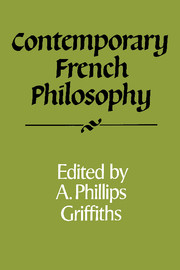Book contents
- Frontmatter
- Contents
- Preface
- Continental Insularity: Contemporary French Analytical Philosophy
- The Misprision of Pragmatics: Conceptions of Language in Contemporary French Philosophy
- Ants and Women, or Philosophy without Borders
- Motifs towards a Poetics
- The Relevance of Cartesianism
- The Enlightenment without the Critique: A Word on Michel Serres' Philosophy
- The Teleological and Deontological Structures of Action: Aristotle and/or Kant?
- The Crisis of the Post-modern Image
- Merleau-Ponty and the Phenomenology of Perception
- Epistemological History: The Legacy of Bachelard and Canguilhem
- History as Genealogy: An Exploration of Foucault's Approach to History
- Beyond Deconstruction?
- Further Adventures of the Dialectic: Merleau-Ponty, Sartre, Althusser
- Paradoxes of the Pineal: From Descartes to Georges Bataille
- Notes on Contributors
- Index
The Relevance of Cartesianism
Published online by Cambridge University Press: 25 May 2010
- Frontmatter
- Contents
- Preface
- Continental Insularity: Contemporary French Analytical Philosophy
- The Misprision of Pragmatics: Conceptions of Language in Contemporary French Philosophy
- Ants and Women, or Philosophy without Borders
- Motifs towards a Poetics
- The Relevance of Cartesianism
- The Enlightenment without the Critique: A Word on Michel Serres' Philosophy
- The Teleological and Deontological Structures of Action: Aristotle and/or Kant?
- The Crisis of the Post-modern Image
- Merleau-Ponty and the Phenomenology of Perception
- Epistemological History: The Legacy of Bachelard and Canguilhem
- History as Genealogy: An Exploration of Foucault's Approach to History
- Beyond Deconstruction?
- Further Adventures of the Dialectic: Merleau-Ponty, Sartre, Althusser
- Paradoxes of the Pineal: From Descartes to Georges Bataille
- Notes on Contributors
- Index
Summary
A philosophy need not be afraid of being out-of-date. Any true philosophy, untimely as soon as it is published, necessarily remains so, thus necessarily remains relevant. This is the case of Descartes' philosophy. But in the case of Cartesianism, there is more to it: Descartes' philosophy goes in quest of the decisive, the principle, the very first Beginning. And the philosophy in quest of the Beginning is, indeed, a radical and original philosophy: what keeps its interest to Descartes' project and, even nowadays, its relevance is the fact that it may be mistaken with the very project of philosophy. In this way what is new in the Beginning, which we think is the shape of the breaking-up, is the old, the oldest. Although Descartes claims for his novelty (‘je serai obligé d'écrire ici en même façon que si je traitais d'une matière que jamais personne avant moi n'eust touchée’, ‘I shall have to write here as if I were dealing with a subject which nobody before me had ever handled’), he keeps coming back ‘to the very prime moment of the Beginning’, to the initial, original Beginning, that of the being: ‘Mit dem cogito sum beansprucht Descartes, Heidegger says at the beginning of Sein und Zeit, der Philosophic einen neuen und sicheren Boden beizustellen’. Now, nothing is more untimely than the inaugural, nothing is more decisive than the foundation: if the relevance of Cartesianism does exist, it is the true one, the original one.
- Type
- Chapter
- Information
- Contemporary French Philosophy , pp. 69 - 82Publisher: Cambridge University PressPrint publication year: 1989

